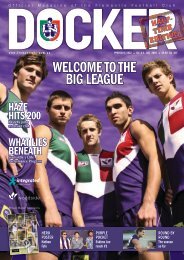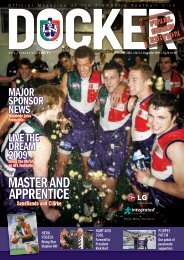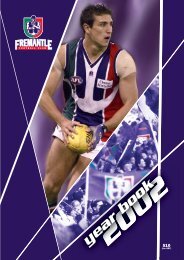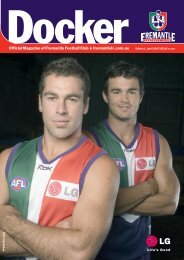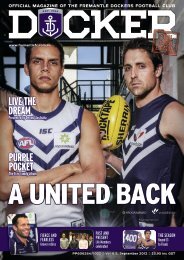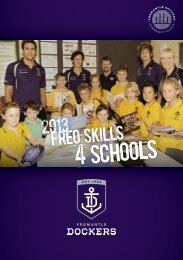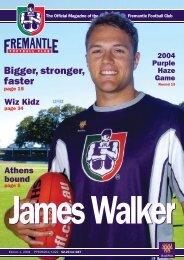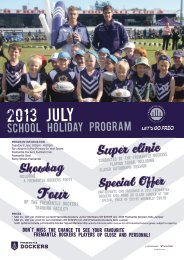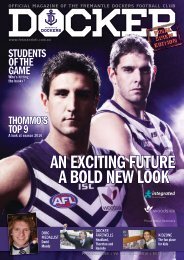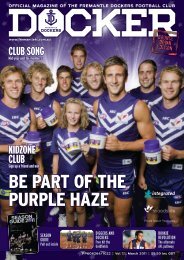FD36a Docker JUL05-REV.indd - Fremantle Football Club
FD36a Docker JUL05-REV.indd - Fremantle Football Club
FD36a Docker JUL05-REV.indd - Fremantle Football Club
You also want an ePaper? Increase the reach of your titles
YUMPU automatically turns print PDFs into web optimized ePapers that Google loves.
Andrew DemetriouFacing20<strong>Docker</strong> fires 20 to AFL Chief Executive Andrew Demetriou.Age: 44Playing History: 103 games Kangaroos (1981-87),3 games Hawthorn (1988)Andrew DemetriouHow would assess the state of the game(attendances, game development, themedrounds, game growth) over the last three years?In regard to attendances we are very pleasedwith how the competition is progressing. Recordlevels of supporters reflect the evenness of thecompetition together with better fixturing andscheduling. Also, the high interest in the gamecomes on the back of playing more games indifferent states and Territories. We have achievedthis despite the redevelopment of the MCGand Skilled Stadium so we are thrilled with theattendance trends around the country. Our themedrounds have been a great success and we aredelighted now that our participation levels see us inexcess of soccer. Through our Game developmentdepartment working in consultation with the states,we invest in excess of $40 million per annum andthese investments are providing significant returns.How would you view the new tribunal system so far?Adrian Anderson was appointed early last year andhas come in and spent eight and a half monthsreviewing the tribunal system, together withresearching tribunal systems and other sportsaround the country. He sought input from theclubs, AFLPA and key football observers and hasimplemented the most significant change of ourtribunal system in the history of the game. In myview the tribunal system is working extremelyeffectively and 85% of our players have taken earlypleas so far this season. The system seems to beworking more efficiently, more consistently. Thematch review panel is an independent group and,along with the tribunal, has got a number of explayerson it. All indications are that the new systemis working very effectively. Having said that I amsure that there will be learnings from this year thatwill further enhance the tribunal system next year.What do you say about a number of controversialcases, such as the Gehrig and Pickett cases?There will always be emotional cases based onclub views. There have also been occasions wherea player has challenged the system and won, toshow his point of view was correct. There willalways be some cases in any system I believe thatwill be questioned but I also think that part of whatwe are seeing here is everybody being educated onthe table of penalties, the levels and of course thedefinitions of negligent, intentional and reckless.Can you bring <strong>Fremantle</strong> members up to date withthe status of the finals and the MCC agreement?We are having very productive discussions withthe MCC – the most productive that I can recall.We will continue to have dialogue because thereis a genuine willingness from both parties toresolve this issue.We are doing everything we can to make sure it isin place for this year’s finals.What are the major challenges for the new mediarights agreement for 2006-2011?To make sure we get a good financial outcomefrom the industry for our stakeholders, our playersour supporters whilst at the same time makingsure that we deal with qualitative issues such asfree to air coverage, our fixturing control and ourcoverage in NSW and QLD is enhanced. We havegot to make sure that we balance our financialexpectations against those other very importantissues that relate to those qualitative issues.Why are media rights so important to the AFL andthe game?The rights are of critical importance. For us, toget reach and exposure into regional areas intoNSW and QLD and ensuring as much coverageon a national basis is a higher priority than afinancial outcome.Can you elaborate on the importance of the AFL’scompetitive balance fund?We are looking at changing the CBF to becomean additional annual special distribution. We wantto take the stigma away from what is attachedto the CBF that it looks like a handout, a welfarepayment. We are working on a formula that relatesto low membership and supporter base of clubsand we want to see if we can work with our venuesto enhance those financial returns for clubs.What will the impact be of 2006 CommonwealthGames to be hosted in Melbourne?It will disrupt the schedule of the fixture. It maymean that more games are played earlier on in theseason at home for the two WA clubs which meansthey will probably play less games at home throughthe back half of the season, but we are trying tominimise the disruption as much as possible.Where will you play those games that are affected?We have committed to play two games at Carraraon the Gold Coast next year. Ben Buckley, theexecutive responsible for our fixture, is stillworking through the remaining matches thatneed to be altered, with the options beingAurora Stadium in Launceston, Telstra Dome inMelbourne, or matches to be back-ended at theMCG in the second half of the season.How is the progress of the game development inQueensland and New South Wales and why arethese states important?The states are important because of the twovery large populations. NSW obviously has thelargest in Australia while Queensland is one ofthe fastest growing populations and economies inthe country. Our Auskick numbers are going verywell in these two states but we need to get morefootball clubs for the Auskickers to go to.What are the major priorities in these two states?We need to get more facilities for football to beplayed. We need grounds that are not rectangles,lights so that people can train and there is a lackof volunteers in those two states. We need to findmore talent in those two states and get more of theoutstanding young players who have got a choiceof Rugby League, Union, Soccer and AFL <strong>Football</strong>– talented young athletes who do not have thatchoice in Victoria, SA and WA. We need to start tomake much more inroads to schools particularly inNSW where we have very little presence.What are the major challenges for the AFL beyond2006 and can you tell us more about the AFL’sStrategic Roadmap?A lot can change in 10 years, you only haveto look at what was happening in 1995.Broadcasting will look different, technologywill be different, venues will be further enhancedwhile the players and the game will be different.We need to be ahead of the game in preparationfor that competition.Do you think the AFL should be involved more inthe way the game is played through rule changes,for example flooding?Our preference is to see the game evolve aswe have done in the past. Our view is that lessintervention seems to be better but that is notto say we should not have an opinion on the waythe game is played. The combination of the AFL,the media, the public and even football puristsare I believe enough to apply enough pressureto the way the game is played, so people do notlose sight that the game needs to stay as anentertainment value.How have you viewed <strong>Fremantle</strong>’s progresssince 2001?Remarkable given that the WA <strong>Football</strong>Commission had its own issues and <strong>Fremantle</strong>had significant debt in a relatively shortperiod of time. They brought in a new coach,new CEO and new Board, new players and theturnaround has been incredible. To be debt free,to grow the membership base and have averageattendances at level that they are, many peopleshould be congratulated.There has been a lot of debate recently on theissue of drugs in football. Adrian Anderson toldus about the Illicit Drug Code earlier this year.Why is that code important?These drugs are an emerging issue in societyand we are concerned for our players who area prime target group. The education processfocuses on the dangers and health risk of thesedrugs and the long term potential implicationsof using them. The advice was that rehabilitation,education and confidentiality are crucial tosuccessfully getting people away from drugs inthe first instance. For repeat offenders we havestrict sanctions including suspensions.Does this have any impact on what happens to aplayer who may be taking performance enhancingdrugs, such as steroids?The AFL has always had zero tolerance toperformance enhancing drugs and that remainsthe case.You have a good relationship with AssistantCoach Steve Malaxos, how did that relationshipdevelop?Steven and I go way back to 1987. We metfollowing a game in London when he was inthe All Australian team. We met through BruceAbernethy and Chris Mainwaring and the four ofus toured France and we became friends. He isa shareholder in my dental business, becameour agent distributor in WA and we havemaintained a very good friendship ever since.You are happily married and the proud fatherof twins but <strong>Docker</strong> understands that therelationship with your wife was kept secret fora while?I met my wife at the AFL. We managed to datefor a period of time that was a secret but thatdid not last too long and now we have twobeautiful twin girls and married life treats mevery well.Just to switch to your playing days, what is yourmost memorable moment as a player?Victorian selection in 1983 and playing finalsfootball. Probably a final against Carlton in 1985when we came back from a long way down to win,stands out.Who would you regard as the best player youhave seen?Wayne Carey.fremantlefc.com.au July 2005 <strong>Docker</strong> 31



